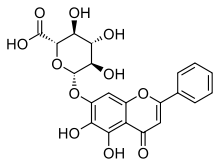Baicalin
Baicalin is a flavone glycoside. It is the glucuronide of baicalein.
 | |
| Names | |
|---|---|
| IUPAC name
(2S,3S,4S,5R,6S)-6-(5,6-dihydroxy-4-oxo-2-phenyl-chromen-7-yl)oxy-3,4,5-trihydroxy-tetrahydropyran-2-carboxylic acid | |
| Other names
Baicalein 7-O-glucuronide; 5,6-Dihydroxy-4-oxygen-2-phenyl-4H-1-benzopyran-7-beta-D-glucopyranose acid | |
| Identifiers | |
3D model (JSmol) |
|
| 70480 | |
| ChEBI | |
| ChEMBL | |
| ChemSpider | |
| ECHA InfoCard | 100.133.557 |
| EC Number |
|
| KEGG | |
PubChem CID |
|
| UNII | |
| |
| |
| Properties | |
| C21H18O11 | |
| Molar mass | 446.364 g·mol−1 |
| Melting point | 202 to 205 °C (396 to 401 °F; 475 to 478 K) |
| Hazards | |
| GHS pictograms |  |
| GHS Signal word | Warning |
GHS hazard statements |
H315, H319, H335 |
| P261, P264, P271, P280, P302+352, P304+340, P305+351+338, P312, P321, P332+313, P337+313, P362, P403+233, P405, P501 | |
Except where otherwise noted, data are given for materials in their standard state (at 25 °C [77 °F], 100 kPa). | |
| Infobox references | |
Natural occurrences
Baicalin is found in several species in the genus Scutellaria, including Scutellaria baicalensis and Scutellaria lateriflora. There are 10 mg/g baicalin in Scutellaria galericulata leaves.[1] It is one of the chemical ingredients of Sho-Saiko-To, an herbal supplement. It is also present in the bark isolate of the Oroxylum indicum tree.
Medical uses
Baicalin, along with its aglycone baicalein, is a positive allosteric modulator of the benzodiazepine site and/or a non-benzodiazepine site of the GABAA receptor.[2][3][4] In mice, baicalin produces anxiolytic effects without sedative or myorelaxant effects.[5][6] It is thought that baicalin, along with other flavonoids, may underlie the anxiolytic effects of S. baicalensis and S. lateriflora.[7][8]
Baicalin is a known prolyl endopeptidase inhibitor.[9] It induces apoptosis in pancreatic cancer cells.[10]
References
- P.H. and Horhammer, L., Hager's Handbuch der Pharmazeutischen Praxis, Vols. 2-6, Springer-Verlag, Berlin, 1969-1979
- Wang H, Hui KM, Xu S, Chen Y, Wong JT, Xue H (2002). "Two flavones from Scutellaria baicalensis Georgi and their binding affinities to the benzodiazepine site of the GABAA receptor complex". Pharmazie. 57 (12): 857–8. PMID 12561253.
- Hui KM, Wang XH, Xue H (2000). "Interaction of flavones from the roots of Scutellaria baicalensis with the benzodiazepine site". Planta Med. 66 (1): 91–3. doi:10.1055/s-0029-1243121. PMID 10705749.
- Edwin Lowell Cooper; Nobuo Yamaguchi (1 January 2004). Complementary and Alternative Approaches to Biomedicine. Springer Science & Business Media. pp. 188–. ISBN 978-0-306-48288-5.
- Xu Z, Wang F, Tsang SY, Ho KH, Zheng H, Yuen CT, Chow CY, Xue H (2006). "Anxiolytic-Like Effect of baicalin and its additivity with other anxiolytics". Planta Med. 72 (2): 189–92. doi:10.1055/s-2005-873193. PMID 16491459.
- Liao JF, Hung WY, Chen CF (2003). "Anxiolytic-like effects of baicalein and baicalin in the Vogel conflict test in mice". Eur. J. Pharmacol. 464 (2–3): 141–6. doi:10.1016/s0014-2999(03)01422-5. PMID 12620506.
- Awad R, Arnason JT, Trudeau V, Bergeron C, Budzinski JW, Foster BC, Merali Z (2003). "Phytochemical and biological analysis of skullcap (Scutellaria lateriflora L.): a medicinal plant with anxiolytic properties". Phytomedicine. 10 (8): 640–9. doi:10.1078/0944-7113-00374. PMID 14692724.
- Stefanie Schwartz (9 January 2008). Psychoactive Herbs in Veterinary Behavior Medicine. John Wiley & Sons. pp. 139–. ISBN 978-0-470-34434-7.
- Tarragó, T; Kichik, N; Claasen, B; Prades, R; Teixidó, M; Giralt, E (2008). "Baicalin, a prodrug able to reach the CNS, is a prolyl oligopeptidase inhibitor". Bioorganic & Medicinal Chemistry. 16 (15): 7516–24. doi:10.1016/j.bmc.2008.04.067. PMID 18650094.
- Takahashi H, Chen MC, Pham H, Angst E, King JC, Park J, Brovman EY, Ishiguro H, Harris DM, Reber HA, Hines OJ, Gukovskaya AS, Go VL, Eibl G (2011). "Baicalein, a component of Scutellaria baicalensis, induces apoptosis by Mcl-1 down-regulation in human pancreatic cancer cells". Biochim Biophys Acta. 1813 (8): 1465–1474. doi:10.1016/j.bbamcr.2011.05.003. PMC 3123440. PMID 21596068.